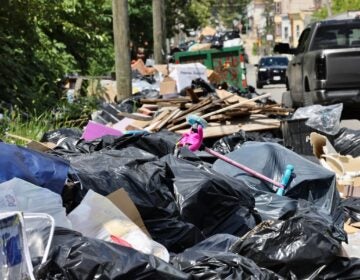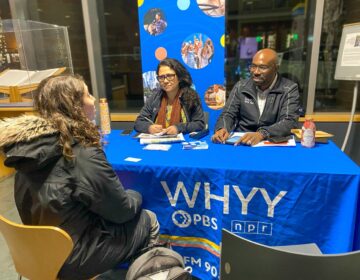Philly Schools Superintendent witnesses a different type of schooling experience at W.B. Saul
With his white butcher’s apron affording some protection from the chill of the meat locker, Guy Amoroso told the special guests before him about the achievements of his students.
Amoroso, the food science instructor at W.B. Saul Agricultural High School for “only” 21 years, told his guests that some of his students had recently been selected for employment at the Reading Terminal Market.
While at the market, his students were utilizing a food-wrapping technique gleaned at Saul when their supervisors took notice and began telling other employees to “wrap it that way.”
“It shows you we’re doing something right up here,” Amoroso remarked.
Touring the Roxborough school
On Tuesday, state Representative Pam DeLissio paired up with state Agriculture Secretary George Greig and William Hite Jr., superintendent of the Philadelphia School District, for a tour of Roxborough’s Saul High School.
The only public agriculture school in the commonwealth – and one of only three nationwide, according to school administrators – Saul is a vocational school that seeks to give its 500-plus students an understanding of and appreciation for the career and leadership opportunities that are available to them in agriculture-related fields.
The tour included a visit to the 130-acre campus farm – home to both livestock and Henry Got Crops, a community-sponsored farm project– along with a meal produced and prepared for the guests by food-science students at the school.
According to DeLissio – a member of the House’s Committee on Agriculture and Rural Affairs – there were several reasons to hold the tour, which she organized. The principal motivation was to draw attention to the plight of the Philadelphia School District and to seek ways to address its chronic budget problems, thus ensuring that both core programs and special offerings – like Saul – have the resources they need.
“The Philadelphia School District is in chaos,” she said. “This school is an absolute gem that is under recognized, and having relationships in all the right places can only help.”
To that end, DeLissio brought together Greig and Hite to witness the various programs at the school. In addition, a representative from the Marcellus Shale Coalition was on hand to provide Saul students and staff with a check for $1,000.
Preserving experiential learning opportunities
Greig, who has visited the school’s Henry Avenue campus in the past, came specifically to support the Future Farmers of America, a national student organization that promotes and supports agricultural education, according to the FFA’s website, as well as raise awareness for the importance of agriculture.
Noting that much of the population is four to five generations removed from the farm-related occupations, Greig related that many Pennsylvanians have little idea about the processes involved with food production.
He observed that Saul is an excellent opportunity for people to see the effort involved in food-production, reflecting upon the idea that Americans spend less of their income on food than in any other country in the world.
“We need to toot our own horn once in a while,” he said, lending his support to current and future practitioners of agricultural trades.
With a proposed budget presented to City Council, Superintendent Hite, hopes to begin using his new-found free time to visit schools in his district.
Asked about the budget presentation – which projected a $300 million gap in funding – Hite referenced Saul, saying “this is why budget process is so important: We have to keep these kinds of experiential learning opportunities for a lot of children.”
Asked about the academic acceptance of experiential learning, Hite said that this instructional methodology is starting to become part of common core.
“Those types of things are valuable learning experiences, and similar to the type of instruction a student would have in college,” he said. “They have to think while they’re there – they have to problem-solve, they have to be inquisitive, and work as a group.”
“It’s everything that instruction should be,” he concluded.
A dedicated and passionate student body
And while its getting praise from city and state officials, it’s also getting high marks from its students, over 90-percent of whom will graduate – a significant statistical leap over the citywide average of an approximately 65-percent.
Shakeria Allice, a sophomore food science major from Germantown, was drawn to Saul because of the unique opportunities afforded to her by attending Saul, a statement reinforced by her simultaneous cradling of a lamb.
“There’s something different about being able to come out here and experience this,” she said. “Just being with all these animals and having the opportunity to learn something I want to do in the future is amazing.”
While occasionally correcting peer perceptions that shoveling animal waste is Saul’s core curriculum, sophomore Brittany Holliday said that her hour-and-a-half commute from Northeast Philadelphia does not dampen her enthusiasm.
“We have to stay committed to what we do,” she said. “We can’t slack off – we have to really work hard here. Saul isn’t just a school you come to have fun; you’re going to have fun but you’re also going to have to work hard too.”
The hard work seems to be paying off. According to Amoroso – who stays in touch with some former students via Facebook – many of his students are currently engaged in various food science fields.
He specifically recalled one young lady, who walked into his food science class not knowing what she wanted to do with her career, is now employed as a biologist for the U.S. Department of Agriculture.
“What we’re doing is spurring them on,” he said.
WHYY is your source for fact-based, in-depth journalism and information. As a nonprofit organization, we rely on financial support from readers like you. Please give today.




